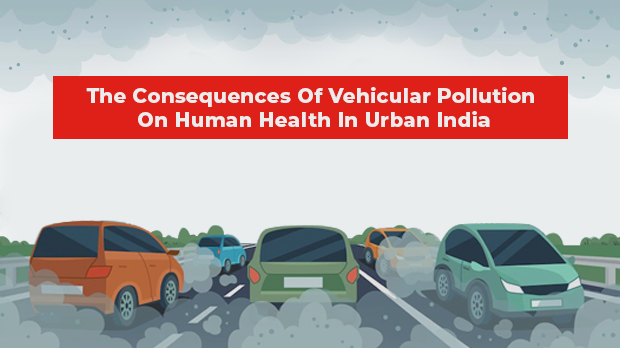
The consequences of vehicular pollution on human health in urban India
The fast growth of urban India has resulted in a massive increase in the number of automobiles on the road. This has doubled in certain cities during the last decade. In recent years, rapid urbanization and the expansion of motor vehicles have had a significant impact on human life and the environment. Automobiles are a major cause of urban air pollution and are becoming a larger source of anthropogenic carbon dioxide and other greenhouse gases. The transportation industry is a key contributor, accounting for 90% of total emissions.
Air pollution is a severe threat to human health in the environment. Nausea, difficulty breathing, skin irritations, birth abnormalities, immunosuppression, and cancer are just a few of the side effects. All of these circumstances show that air pollution is becoming a serious issue in India, and that there is an urgent need to create a healthy atmosphere and raise the level of research globally. The current study examines the rise in vehicle pollution in India and its impact on human health as a result of increased road traffic.
In major cities, the contribution of various sectors to ambient air quality mainly are domestic sector 8 %, industrial sector around 20 % and vehicular emission around 72 %.
‘In India, there are an estimated 300 million automobiles’
'There are an estimated 300 million automobiles in India.'
Over the last five years, the number of tiny dangerous particles in Mumbai's automobile traffic has nearly doubled, making it the city's biggest contributor to the city's already poor air quality.
According to a research conducted by the System of Air Quality Weather Forecasting and Research (SAFAR), the transportation sector accounted for 30.5 percent of PM 2.5 emissions in 2019-20, up to 16 percent in 2016-17.
According to SAFAR, industry and power plants contributed 18 percent of PM2.5 emissions in 2019-20, down to 36 percent in 2016-17.
In the same way, municipal garbage contributes 21.5 percent in 2019–20.
Solid waste plants, open burnings, crematoriums, the aviation sector, brick kilns, and other municipal waste contributors are among them.
Home burnings, which include residential cooking, emissions from street sellers, and wood burning, have decreased from 27% in 2016-17 to 15% in 2019-20.
According to Dr. Gufran Beig source taken from TOI article, senior scientist and founder project director of SAFAR, the change was caused by a combination of increased vehicle traffic in Mumbai and more stalling at traffic signals, resulting in traffic congestion.
A need based step taken by ParkingAdda to try and better the vehicle traffic
Online parking is one of the fastest growing and most widely used Smart City Solutions in the world. Universities, airports, public garages, and shopping malls are just a few of the businesses that have begun to reap the benefits of automated/smart parking technology through the usage of various Digital Parking applications. The ability to connect, analyze, and automate data collected from gadgets, referred to as and powered by the Internet of Things, has made this modern parking system possible.
“4 wheeler density on the streets of Mumbai was around 12 lakhs in 2020, an overall surge of 30% in total number of vehicles is expected by 2025”.
In India, ‘ParkingAdda’ is one of the first movers in the market to introduce convenient online parking solutions, which any individual can reap benefits from. We have developed our own proprietary technology and have manufactured our sensors in-house, we are a ‘Make In India’ initiative. Our IOT-based smart parking management system enables parking operators to utilize parking resources more efficiently while also providing drivers with simplicity of use. Drivers can identify parking spots sooner with an effective parking management solution, which cuts fuel costs, saves time, and, most importantly, minimizes irritation. Because Parking Management solutions not only assists you to identify vacant spots faster, it also guides you to your exact parking spot through Maps. One of the stand-out USP of ParkingAdda is that every parking location will have representative you can contact after booking, for any additional guidance. Sensor installations and dedicated parking representatives gives a trust feeling of vehicle and space safety. Better and easy app usage increases authorized car park occupancy and also income to space renters.
The digital parking system from ParkingAdda uses real-time data, apps, and accurate sensors to show users which parking spaces are available and which are not. The idea is to cut down on time spent physically looking for a suitable parking lot, space, or even floor. Some systems may offer a comprehensive set of services, including parking time notifications, online payments, and even car-finding capabilities for larger parking lots. In terms of environment friendly issues we ParkingAdda provides the below solutions-
1. Parking optimization: Users can use the app to discover the best available parking spot, saving them time, effort, and money. The parking lot soon fills up, and businesses and commercial organizations can take advantage of the available space. Unauthorized parking and on-street parking can both be reduced.
2. Improved Traffic Flow: As fewer cars are required to go about looking for an open parking spot and roadside parking can be reduced, traffic flow improves.
3. Pollution reduction: Looking for a parking spot uses far too much automobile oil, gasoline, diesel, CNG, and other fuels in a single day. An ideal parking solution will greatly reduce travel time while also reducing the amount of daily car exhaust and, as a result, India's and the world's pollution levels.
4. Simple Integrated and Paperless Payments: The 'ParkingAdda' application collects and distributes invoicing and payments. This reduces use of paper challans and receipts and also helps the organization maintain account transparency between customers and vendors.

